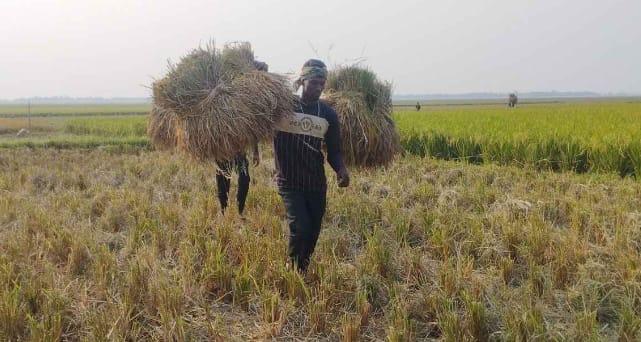“Bad luck. Aman crops were damaged, and I thought I could make up for it with Boro crops. But that didn’t happen either,” lamented haor farmer Bacchu Mia.
Where farmers usually expect to harvest 18 to 20 maunds of Boro paddy per bigha, they are now getting only 8 to 10 maunds. Although the paddy appeared healthy at first glance, after harvesting, most of it turned out to be empty husks, said another farmer, Ahmad Mia.
Farmers from the Kawadighi Haor area in Moulvibazar reported that prolonged drought and lack of rain dried up vast stretches of haor land, leading to pest infestations and empty husks in the paddy. Later, natural calamities like hailstorms destroyed their last hope.
Local farmers shared that the devastating floods of 2024 caused significant damage to Aman crops in various upazilas of Moulvibazar district. They had pinned their hopes on the Boro season to recover from the losses, but adverse weather conditions have dashed those hopes again.
Farmers worry that consecutive losses in Aman and Boro crops will make recovery difficult, pushing their households into financial struggles.
According to the Department of Agricultural Extension in Moulvibazar, the target for Boro cultivation this year was set at 62,100 hectares, including large haors like Hakaluki, Hail Haor, and Kawadighi, as well as smaller haors and highlands.
Abdur Rakib, a farmer from Rasulpur, cultivated Boro on eight bighas of land, spending approximately 7,000 BDT per bigha. “Where I should have harvested 20 maunds per bigha, I’m doubtful about even getting 10 maunds. Now, I’ll have to rely on loans to sustain my family,” he said.
Mizu Ahmad, a farmer from Parashimail village, shared, “Many of us didn’t get Aman crops this year; everything was submerged during the floods. We relied on the Boro harvest, but pests and empty husks have ruined that too. I spent 50,000 BDT on 10 bighas, and now it’s difficult to even cover the costs.”
Sixty-year-old farmer Parimal Biswas from Baneshree area said, “The prolonged drought and lack of rain dried up the haor land, causing pests and empty husks to appear in the paddy. As a result, we won’t even get half of the expected Boro yield this year.”
Alamgir Hossain, president of the Haor Protection Movement Committee in Moulvibazar Sadar Upazila, stated, “The floods of 2024 severely affected Aman crops in this region. Now, hailstorms, drought, and lack of water have disrupted Boro crops as well. If rivers and canals in the haor were dredged and water sources maintained, much of this problem could have been mitigated. We are also demanding agricultural subsidies for farmers.”
Md. Jalal Uddin, Deputy Director of the Department of Agricultural Extension in Moulvibazar, said, “Overall Boro production has been good, but some areas have suffered losses due to adverse weather. Plans are in place to assist affected farmers.”

